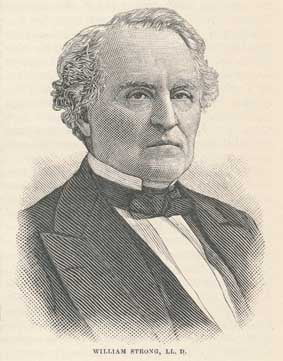Christian principles should influence American society
 William Strong was no mere cultural Christian. Listen to how he answered the question of what he thought of Christ. He said, “He is the Chiefest among ten thousand, and altogether lovely — my Lord, my Savior, and my God.” Far from being a cultural Christian, William Strong was a committed Christian, and a Presbyterian as well.
William Strong was no mere cultural Christian. Listen to how he answered the question of what he thought of Christ. He said, “He is the Chiefest among ten thousand, and altogether lovely — my Lord, my Savior, and my God.” Far from being a cultural Christian, William Strong was a committed Christian, and a Presbyterian as well.
The son of a Presbyterian minister, William Strong was born in Connecticut on May 6, 1808. After graduating from Yale University in 1828 with honors as a Phi Betta Kappa, he then moved to Reading, Pennsylvania to begin his legal practice. In 1846, he became a Congressman, serving as an abolitionist Democrat in the House of Representatives. Serving two terms, he did not seek reelection in 1850, but returned to his private practice.
Seven years later in 1857, he was elected to the Supreme Court of Pennsylvania as a Democrat but switched to the Republican party soon afterwards. He would serve eleven years on that state bench before returning to a lucrative law practice in Philadelphia.
On February 18, 1870, he was nominated by President U.S. Grant to the United States Supreme Court. Among his many important votes was the resolution of the disputed election of 1876, when the Court ruled in favor of Rutherford B. Hayes, the Republican candidate, thus ensuring his presidency. He served ten years, and then resigned even while he was in good health, believing that justices should not serve when they are infirm. William Strong would go to be with His Savior on August 19, 1895.
All of the above facts are about his service to the nation. And while true, yet they do not get to the character of this Christian Presbyterian. Listen to his words on what he thought about the Bible. He said, “It is the infallible Word of God, a light erected all along the shores of time to warn against the rocks and breakers, and to show the only way to the harbor of eternal rest.” With such a high view of Holy Scripture, there was no problem for Justice Strong to believe that biblical Christian principles should govern many facets of United States society. In fact, he would even go so far as to declare and work for a constitutional amendment declaring our blessed country to be a Christian nation. This in no way in his own mind meant that an established church or denomination was to be the sole church of the land. He was opposed completely to that idea. He believed in the separation of church and state, but he affirmed the connection between the God of the Bible and our nation. He desired a formal acknowledgement of the Christian foundation in American society.
During his long practice both privately and publicly, he served in many Christian organizations, among them, the American Bible Society and the American tract Society. He is buried in Reading, Pennsylvania.
Words to Live By: As was his life-long commitment to both the living Word and the written Word, so all Christians today in whatever sphere they are in life, ought to have a similar commitment to Christ and His Word. Let us press today toward the goal of placing Christ and His Word into all areas of our lives.
